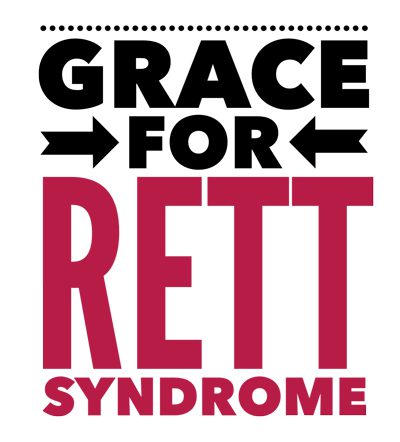Hi all and happy awareness month (it’s starting to feel like a holiday).
7 years ago this month, my husband returned from a trip to Nigeria and as soon as we met him on the train platform, his first words were “what’s wrong with Grace?” Rett syndrome for Grace wasn’t a slow progression. It wasn’t the gentle tearing away of all she knew like it is for some girls.
Grace was ‘strange’ from birth. She was extremely placid. Never cried. Slept all night. Just sat there smiling away. Her hands doing ‘retty things’ which I can only see when I watch those videos with rettrospect. At just two, three, four months…people would cock their heads and look as though to say “she doesn’t seem normal”. She never bore weight on her legs. Never learned to sit up or speak. Yet overnight, she changed. Rett hit her with a vengeance and I sat up every night for 6 weeks waiting for that diagnosis. Crying, holding her in the rocking chair.
Note: A Rett diagnosis is a surefire way to lose all your baby weight.
While I have never stopped grieving, it didn’t take very long (a couple years maybe) for this life to seem completely normal. To find that magical “new normal” that I read about. To find medications and surgeries and ambulance trips…well…normal. I remember this one time she was getting an ambulance after a seizure and I did my morning makeup on the way. “You seem pretty laid back about this so we’re taking that as a good sign” he said. “Yea she’s fine – this is just a technicality”. And it was. And she was out within a couple hours, smiling and rather proud at securing herself a day off from school.
There are a few things I wish someone told me when she was diagnosed. So many things I learned along the way.
1. Edit Your Team
There will be people who come into your daughter’s life who don’t align with your goals for her. We once had a speech therapist who went blank whenever I referenced the fact that Grace wasn’t “cognitively delayed” but, rather, just had a processing disability. In fact, there was a point where she said that we would just have to agree to disagree. Bye, Felicia.
In “team around the child” meetings, I regularly coach all members of Team Grace that “to be on Grace’s team, you must presume competence.” End of. Anyone not on board with Grace’s abilities or potential doesn’t stay on Team Grace.
Another reason you might want to cull the team around you is that you might not find so many professionals manageable at first and you should take control if you feel out of control of your/her own destiny. I was trying to come to terms with the diagnosis and my house was filled with people. I felt pressured to suddenly become a therapist, a doctor, a specialist overnight. I was only just trying to understand what Rett syndrome was and yet I had professionals throwing terms and homework at me which just wasn’t manageable. My pile of paperwork, assessments, logs to keep grew every day. You know how when you’re in school, each teacher gives you “just a little homework” but it keeps you up till midnight? I had to let some people go. When your daughter gets older, special school will be a big help. Grace now meet her therapists and all that happens in school. At home, I’m just mom which is enough to try to be, even on the best day.
2. Therapy
A few years in, I went to a family conference. The majority of parents I met took their girls to daily or weekly therapy sessions -horse therapy, music therapy, physical therapy- left me judging myself to be inadequate and lazy. At one point I ended up in the hotel room bawling my eyes out and my friend said something that totally set me free: “Look at all those girls. Are they doing any better than Grace, even with all that therapy? No. You’re doing fine.” And that was that. And I never beat myself up about it again.
3. You
Now for a different type of therapy. I’m 7 years into this diagnosis and just realised that I need therapy. Bad. I had to be “the strong one” (a role I imposed on myself) all these years.
When everyone is telling you you’re made of steel, how do you say “actually, I’m falling apart”. So I turned off the waterworks, hardened my heart and assumed the position of stalwart steely supermom who you better not cross when it comes to her daughter. I assumed the persona of charity woman. Activist. Genetic know-it-all. Rett expert extraordinaire. Faux doctor. Little did I know I was destroying my marriage and myself in the process. I turned my face away from anyone who held me account for my actions and just forged ahead like a woman possessed and no one dared get in my way.
Until I hit a brick wall and had a mirror held to my face and realised I was engaged in a vicious cycle of grief, denial and shame. I had been to a variety of psychotherapists in my adult life (which my friends say is “so American” of me) to try to unpack the things I thought were wrong with me. My addiction to work, my desire to be thought of as amazing at all costs, etc. But I’ve come to realise that these things are just symptoms and I wasted great amounts of money and years skirting around the cause, focusing on the symptoms. My illness is that my kid has Rett syndrome and I have never properly grieved. I mean…I’ve been grieving. Boy, have I been grieving. But I hadn’t grieved.
I heard about this thing once called ‘perpetual grief’. That is, when something happens but doesn’t really end. Unlike loss which has some sort of conclusion, a diagnosis you live with long term can cause one to perpetually grieve and never come to a conclusion.
All of that depressing shit to say:
- focus on you
- don’t wait until you’re desperate for it
- and then keep doing it even once you think you’re ‘ok’
Those are three themes which stood out to me when I decided I wanted to write about things I wish I knew sooner.
If you’re facing a new diagnosis, I wish you all the best in your experience and, as always, want to remind you that:
- Time heals
- Someday this stage will feel like another lifetime ago
Much love.





